Can Cats Eat Apples? Here's How To Safely Feed Apples To Your Cat
15.03.2022.
Apples are a versatile and delicious fruit, whether you're baking an apple pie or eating a crisp apple slice with peanut butter. Apples, high in vitamins and fiber, have long been a late-summer and early-fall staple in our diets. But can cats eat apples? Are apples a viable option for our feline friends?
Apples may be high in antioxidants for humans. Still, our feline companions have different digestive systems that process "human foods" in very different ways. Some foods may be non-toxic or even beneficial to a cat's diet, whereas others may cause problems and have long-term, long-lasting effects. Here's everything you need to know about cats eating apples.
RELATED: Can Cats Eat Peanut Butter? What Do Vets Say?
Should I Feed My Cat Apples?
The truth is that fruits are not a natural part of a cat's diet. Cats are carnivorous, and too much sugar (even natural sugar) in a cat's diet can cause digestive issues or diabetes. It is ultimately advised not to feed apples to cats in large quantities, especially as a meal replacement.
The good news is that you won't have to fight your cat about who gets your apples. Cats lack taste receptors for sweetness due to their carnivorous appetites, so any sweet treat, including apples, will not really excite them or even spark their interest.
If you do give your cat a piece of your apple, make sure they don't eat the seeds. Although the apple itself is not toxic to cats, the seeds contain cyanide and are poisonous to them.
Is There a Nutritional Advantage to Feeding Apples to Cats?
The simplest and most convenient way to meet the nutrient requirements of cats is to provide them with a complete and balanced commercial diet. Keep in mind that our nutritional needs are different, and a balanced diet for cats may not look like what we'd consider a balanced diet for humans. Because cats are obligatory carnivores, they rely on nutrients found only in animal products. That is why vegetarian diets are unsuitable for cats. They require vitamins, minerals, and by-products from food similar to what they would eat as hunters in the wild.
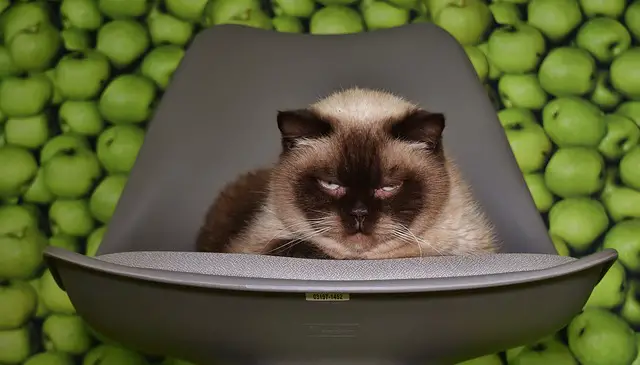
Treats like apples aren't necessary if your cat gets all its required nutrients from its regular diet of specially formulated cat food.
RELATED: Can Cats Eat Bananas? What Would Your Vet Say?
Is There a Risk in Feeding Apples to Cats?
While apples are considered a safe food for cats, there are some precautions to take. Apples are generally regarded as safe for cats with no underlying health issues. This general rule does not apply if your cat has a medical condition, such as diabetes.
Every cat is unique, and its tolerance for certain foods can vary greatly. Think of cats as individuals that will have different reactions to the same foods. Some cats might eat them without issues, and others might show adverse reactions and digestive issues.
RELATED: 7 Best Cat Treats You Can Pick
The majority of your cat's calories should come from foods that have been specially formulated to provide them with the nutrients they require. Human foods, such as apples, should be given only infrequently and in moderation.
Apple stems, leaves, and seeds contain cyanide, which can be toxic to cats in large amounts. If your cat eats any of these parts, contact your veterinarian as soon as possible.
Can Cats Eat Applesauce?
Applesauce may appear harmless, but prepackaged applesauce may contain chemicals and preservatives that a whole apple does not. On the other hand, if you're making homemade applesauce and your cat takes a lick or two, it won't harm them because pureed foods are easier for cats to digest.
RELATED: Can Cats Eat Blueberries? Are They Safe?
How Much Can My Cat Safely Eat?
Don't worry if your cat nibbles on a piece of your apple; apples are not toxic to cats. However, if apples were added to your cat's diet regularly, they could cause obesity and diabetes. Although apples are beneficial to diabetics, cats digest fruit sugar in a very different way. Raising a cat's blood sugar level on a regular basis can lead to a whole lot of long-term health problems. One such issue is feline diabetes. Symptoms of feline diabetes are:
- Extreme thirst
- Continual urination
- Appetite loss
- Unable to jump
- Vomiting
Contact your veterinarian as soon as you notice these symptoms because they could be the first signs of diabetes. If you're concerned about your cat's sugar intake in general, check the packages of food you buy. Some cat treats may contain an excess of sugar and carbohydrates.
RELATED: Can You Give Bread to Your Cat? Is It Safe?
How to Include Apples in Your Cat's Diet Safely
If you’re absolutely adamant about feeding apples to your cat, here are some precautions you should take to keep your cat safe:
- Make sure to thoroughly wash the apple. To make apples look shiny, some are treated with pesticides or sprayed with shellac, a raisin. Even better, peel the skin off the fruit to make it easier for your cat to chew and digest.
- Remove the seeds, stem, and leaves from an apple and cut ut into small bite-sized pieces that your cat can manage.
RELATED: Can Cats Eat Strawberries? Will They Benefit From Them?
- If you give your cat an apple for the first time, offer them only a tiny amount (a teaspoon of chopped pieces should suffice) and keep an eye out for adverse reactions. Observe your cat for 24 to 48 hours to ensure that no adverse reactions, such as vomiting or diarrhea, occur. Call your veterinarian if they exhibit signs of gastrointestinal distress.
- Hand-feeding your cat apples or mixing a little apple puree into their regular food is the best way to feed them apples. Make sure they don't consume more than 10% of their daily calorie allowance from treats.
- Again, it's best to give apples only on occasion to avoid the high sugar content having a negative impact on your pet's health and weight. Once or twice a week, in the above-mentioned limited portion sizes, should be more than enough.
- Never give rotten apples to your cat because they are more sensitive to rotten fruit than humans. A rotten apple can cause diarrhea and other digestive problems, and fermented fruits can cause an alcohol-induced coma. In general, don't feed your cat anything you wouldn't eat yourself.
RELATED: Can Cats Eat Chocolate? Is it Safe?
Consult your veterinarian before introducing new human foods to your cat, even if they are considered cat-safe. Your cat might have a specific health issue that might prevent them from eating particular types of foods.
World Cat Finder Team

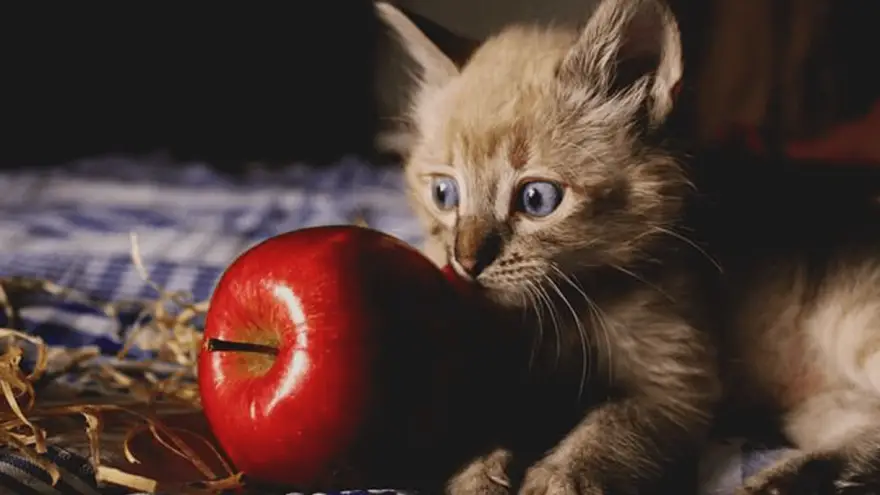

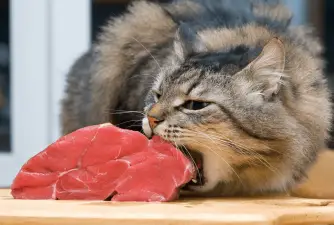
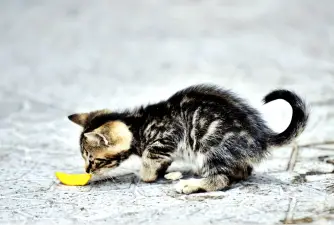
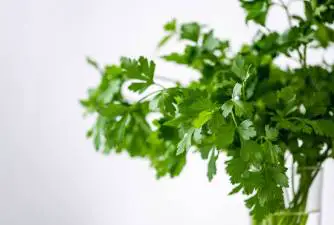

Share